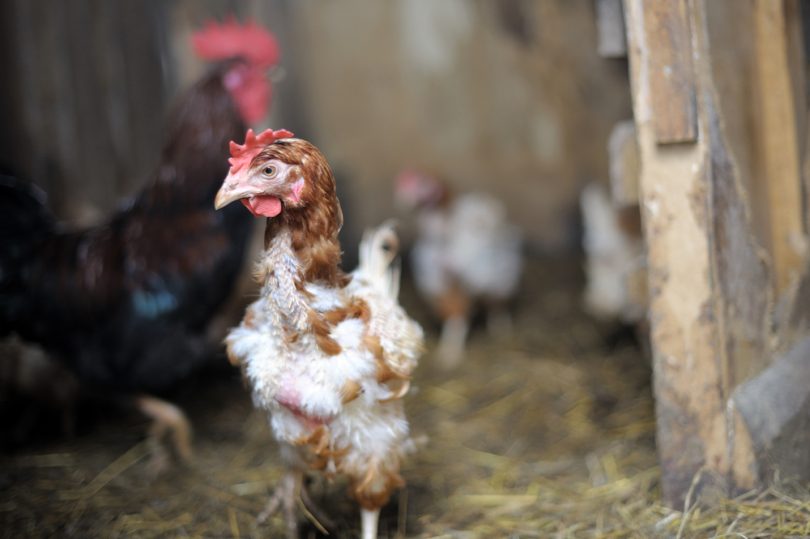
Make sure your moulting chooks have good protection from the wind and early cool snaps. File photo.
The Autumn Equinox and shorter days are signals for a change of feathers in the hen house.
Heading into winter your chooks will normally grow new feathers to replace some old ones.
Here’s what you should know:
- Avoid handling chooks. Moulting makes feather follicles very sensitive, even painful;
- Make sure they have good protection from the wind and early cool snaps;
- An early slow ‘soft’ moult means the chooks don’t lay for a longer period. A late hard moult means they return to lay faster;
- Feathers are made of keratin, a protein, so boost their diet with protein treats;
- Boost protein intake early, ideally before a moult begins;
- Moulting always starts at the head and moves down the body.
Managing the stress of moulting
Chooks can get moody during the moult and their immune system can be depleted.
If chickens aren’t getting enough protein, they may peck at other birds feathers and eat them to increase their protein levels. It doesn’t take much for a wound to appear and chickens love to peck at red blood, which makes the wound worse. You should always separate birds if this starts to happen.
Give them a protein boost platter!
Here are some common sources of protein to help your chooks:
- Hard-boiledd eggs – 91% protein, never feed them raw eggs!
- Fish or fish meal – up to 70% protein, sardines have high levels of Omega 3 oils, any oily fish is excellent;
- Mealworms – 53% protein dried, around 30% live, buy online;
- Pumpkin seeds – 31-33% protein, fresh is best, chop to edible size;
- Sprouted lentils/buckwheat – 26-30% protein, tasty, high in minerals, low in fat;
- Cat food – 26-30% protein, yummo!
- Sunflower seeds – 23% protein, disease-preventing phytochemicals, smashed helps;
- Garden peas – 23% protein, frozen peas are great;
- Parsley – 21% protein, must be chopped, a good source of calcium and anti-carcinogens.
Chooks are greedy so remember:
- High protein foods are not to be fed as a substitute for a good quality chicken feed but as an occasional treat;
- Don’t overfeed, restrict to moulting and hard winters. Overweight chickens will develop various health problems and won’t be good egg layers;
- You will still need to supply normal feeds, shell grit and water;
- New foods will be eyed with great suspicion at first, until your flock decides those strange looking fish pieces or mealworms aren’t going to kill them after all!
- Use corn sparingly, it can reduce the overall protein intake of your birds.
As an extra make your chooks ‘Moulting Moments’ a healthy, tasty treat. Or Natural Chicken Health’s Super Mash alleviates the stress of moulting with apple cider vinegar and seaweed to boost their immune response.
Moulting Moments recipe:
- 2 cups Chick Starter Crumble
- 2 cups High Protein Bran
- 1 cup Rolled Oats
- 2- 3 cups fresh Sprouts – wheat, buckwheat, lentils, alfalfa, mung beans
- 2 cups cooked Linseed/Flaxseed – cook in lots of water 1 hour
- 1 cup Black Sunflower Seeds
- 5 Eggs – including shells
- ½ cup melted Coconut Oil
- ½ cup Blackstrap Molasses
You could also add grated carrot, chopped pumpkin seed, chopped parsley, other seeds or whatever is on hand.
Wet hands and roll into a ‘golf ball’.
Place on baking tray, close together because they don’t spread, and bake at 170C for an hour or longer until dry and hard. Leave in the open to dry further for a couple of days.
Introduce by breaking a few up for them to try.

Moulting Moments, ready for the oven. Photo: Geoffrey Grigg.
Cheryl Nelson is the brains and heart behind Natural Chicken Health.
Subscribe HERE to the Natural Chicken Health Monthly Newsletter Vlog and follow Natural Chicken Health on Facebook.







